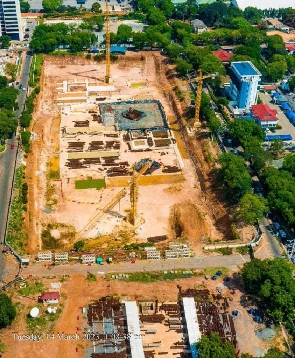In the realm of governance, decisions, and priorities often take center stage, reflecting the values and aspirations of a nation. Recent events in Ghana have illuminated a significant crossroads where choices made by leaders reflect not just their vision for the country, but also the very essence of our collective values.
In the grand tapestry of a nation's priorities, few threads are as significant as the construction of a house for the Divine. In Ghana, this undertaking takes the form of the National Cathedral, a project championed by His Excellency President Nana Akufo-Addo.
While the endeavor is noble, a disconcerting dissonance emerges when juxtaposed with the predicament of affordable housing projects, notably the Saglemi initiative.
The sacred scriptures remind us that in our actions towards the least among us, we serve the Divine. It is perplexing then, to witness the demolition of homes, once sanctuaries for judges, to erect a dwelling for God. One cannot help but ponder: can the Almighty truly find solace in edifices crafted by human hands, while the shelter of His children is cast aside?
The second strain in this discordant melody is the abandonment of the Saglemi housing project. A beacon of hope in a landscape marred by housing deficits, it was designed to provide comfort and stability for countless Ghanaian families. Yet, the government laments a lack of resources, even as funds are rallied for the National Cathedral.
As one reflects on this, the wisdom of the ages resounds: "If a man says he loves me, yet hates his brother, he is a liar, and the truth is not in him." A nation's love is best demonstrated through deeds that uplift its citizens, ensuring that no one is left to fend for themselves.
The Saglemi project stands as a testament to the potential of transformative housing initiatives.
Growing up in the late 80’s, I recall the low-cost government quarters that cradled my family during my father's tenure as a public servant until his retirement about thirteen years ago. These abodes, courtesy of the Acheampong administration, were a sanctuary for dedicated civil servants, illustrating how astute housing policies can alleviate the burdens borne by those who serve their nation far from their roots.
Today, as a concerned citizen and fervent Pan-African, I implore the government to redirect its focus. The abandoned affordable housing projects, particularly Saglemi, yearn for the final strokes of completion. It is not a plea for charity, but a call to honor the commitment made to citizens, to be the stewards of their wellbeing.
To heed the President's call for active citizenship is to be unyielding in our pursuit of the greater good. We are citizens of Ghana, and by extension, citizens of Africa. Our duty is to advocate for policies that uplift, homes that nurture, and initiatives that uplift the collective spirit.
In the symphony of a nation's priorities, may the refrain of compassionate governance resound. Let the legacy we bequeath to future generations be one of benevolence, where the welfare of every citizen is cherished above all else. It is through these endeavors that we honor not only our earthly abode but the Divine dwelling within us all.
As many Ghanaians are struggling to find places to lay their heads, the junction between the National Cathedral and affordable housing projects symbolizes a choice—a choice between grandeur and compassion, between spiritual devotion and the practical needs of our people.
Let us hope that our leaders choose a path that aligns with our values, where the welfare of our fellow citizens is paramount, and where God's presence is felt not just in cathedrals of stone but in the hearts and homes of every Ghanaian.
Opinions of Monday, 16 October 2023
Columnist: Dwomoh-Doyen Benjamin















